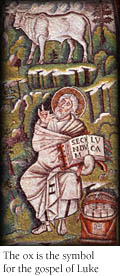The Gospel of Luke
This gospel tries to answer the question, "Can Christians who believe in the Kingdom of God also be loyal subjects of the Roman Empire?"by Marilyn Mellowes
 The author of Matthew wrote of a Kingdom that would embrace Jews and gentiles
alike. The author of Luke wrote for a community which also awaited the arrival
of God's Kingdom, but which was concerned about its life in another Kingdom,
the Kingdom of Caesar. The question they faced was this: can Christians who
believe in the Kingdom of God also be loyal subjects of the Roman Empire?
Luke's unequivocal answer was "Yes."
The author of Matthew wrote of a Kingdom that would embrace Jews and gentiles
alike. The author of Luke wrote for a community which also awaited the arrival
of God's Kingdom, but which was concerned about its life in another Kingdom,
the Kingdom of Caesar. The question they faced was this: can Christians who
believe in the Kingdom of God also be loyal subjects of the Roman Empire?
Luke's unequivocal answer was "Yes."
Tradition holds that the author of the gospel of Luke was a physician and a traveling companion of the apostle Paul. History offers no evidence to substantiate these claims, but the work itself suggests that it was composed by someone who lived in one of the cities where Paul had established his early churches. The composition and language of the work suggests that its author was well-educated, fluent in Greek, and possessed a keen sense of literary style.
Whoever wrote Luke wrote more than a gospel; he also wrote the Book of Acts, an account of the growth and expansion of Christianity after the death of Jesus through the end of the ministry of the apostle Paul. In fact, many scholars insist that Luke's gospel is just the first half of a two-part story that begins with Jesus in Nazareth and ends with Paul in Rome. In the words of Mike White, "He is telling a bigger story, a grander story." And that story has decisively shaped how Christians have viewed the origins of their church.
It has also deeply influenced how the later church came to imagine the birth of Jesus. For it is Luke who presents the familiar tale of his birth: "And in those days, a decree went out from Caesar Augustus that all the world should be taxed." (LK 2:1) Luke describes how Joseph and Mary journeyed from Nazareth, in the region of Galilee into Judea, to Bethlehem. Why does Luke tell the story this way? Scholars speculate that he is placing the birth of Jesus in Bethlehem because Bethlehem is the city of King David; Luke is drawing a direct parallel between the first king of Israel and the new King, Jesus Christ.
According to some interpreters, Luke's Jesus is not only a king, he also resembles a Greek philosopher. Others suggest that Luke's Jesus more closely resembles a semi-divine hero, such as those portrayed in popular stories and celebrated in Greek song.
The Jesus of Luke is a powerful figure. In the words of Holland Hendrix, "He comes on the scene as a prophet straight out of the Hebrew Bible. At his first appearance in his hometown, he quotes the prophet Isaiah. He comes across as a liberator, a great miracle worker. But also as the quintessential benefactor figure." Unlike Matthew's Jesus, who blesses the poor in spirit, Luke's Jesus simply blesses the poor.
After a series of blessings addressing the peoples' physical needs, Jesus offers advice on how to live a good life: "But I say to you that listen, Love your enemies, do good to those who hate you, bless those who curse you, pray for those who abuse you. If anyone strikes you on the cheek, offer the other also; and from anyone who takes away your coat do not withhold even your shirt. Give to everyone who begs from you; and if anyone takes away your goods, do not ask for them again. Do unto others as you would have them do to you." (LK 6:27-31).
One of the most notable differences between Luke's gospel and those of Matthew or Mark is, in Francois Bovon's words, "its sense of joy." The gospel begins with the joyous account of Jesus' birth and ends on the victorious note of Jesus' resurrection and ascension into heaven. The sense of abandonment that characterizes Mark's ending is reduced to a brief interlude in Luke's story. As Luke's gospel ends, Jesus has departed in body. But at the beginning of Acts, his Spirit returns, guiding the disciples to the successful completion of their mission.
Compared to the other gospels, the Jesus of Luke is less of a rabble-rouser; so, too, is the apostle Paul. This tells us something about Luke's audience: it is learning to live and to flourish in the Roman world, becoming absorbed into its surrounding society and culture. Luke wants to assure his Christian community -- and their neighbors -- that there is no conflict between faith in Jesus and loyalty to the Emperor. The kingdom of God and the Kingdom of Caesar can peacefully co-exist side by side; Christians can be good citizens of both the earthly and heavenly realms.
Luke's hopes for acceptance are reflected in the way he portrays the death of Jesus. His last words are "Father, forgive them, for they know not what they do." (LK23:34) The Jesus of Luke dies with calm resolution: he knows that his death will be followed by the birth of the church.
